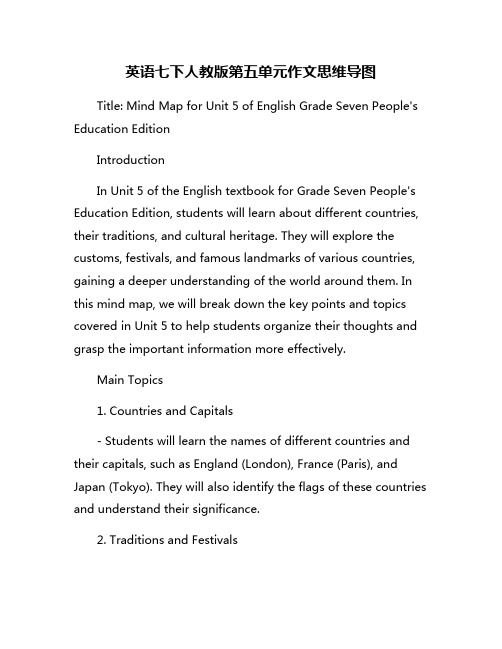人教版七年级下英语各单元主题思维导图
英语学习辅助:七年级下册各单元思维导图(人教版)

英语学习辅助:七年级下册各单元思维导图(人教版)Unit 1: My Day- Vocabulary: Daily routine, actions, time expressions- Grammar: Simple present tense, adverbs of frequency- Listening: Listening to and understanding daily routines- Speaking: Describing daily routines and habits- Reading: Reading about daily routines of different people- Writing: Writing a paragraph about one's daily routineUnit 2: I Love Sports- Vocabulary: Sports and related words- Grammar: Present continuous tense, imperatives- Listening: Listening to sports-related conversations- Speaking: Talking about sports preferences and abilities- Reading: Reading about different sports and their rules- Writing: Writing a short paragraph about one's favorite sportUnit 3: At a Party- Vocabulary: Party-related words, food and drinks- Grammar: Present continuous tense, countable and uncountable nouns- Listening: Listening to conversations at a party- Speaking: Describing a party and expressing preferences- Reading: Reading about different party activities- Writing: Writing an invitation to a partyUnit 4: Our School Life- Vocabulary: School subjects, school facilities- Grammar: Present simple tense, questions and answers- Listening: Listening to conversations about school life- Speaking: Talking about school subjects and activities- Reading: Reading about school life in different countries- Writing: Writing a short paragraph about one's school lifeUnit 5: My Family- Vocabulary: Family members, adjectives to describe family members- Grammar: Possessive adjectives, possessive 's- Listening: Listening to conversations about family members- Speaking: Describing family members and their relationships- Reading: Reading about different types of families- Writing: Writing a short paragraph about one's familyUnit 6: Our Neighborhood- Vocabulary: Places in a neighborhood, directions- Grammar: Prepositions of place, there is/are- Listening: Listening to conversations about places in a neighborhood- Speaking: Giving directions and talking about one's neighborhood - Reading: Reading about different places in a city- Writing: Writing a short paragraph about one's neighborhoodUnit 7: Healthy Habits- Vocabulary: Health-related words, healthy habits- Grammar: Should/shouldn't, imperatives- Listening: Listening to conversations about health habits- Speaking: Talking about healthy habits and giving advice- Reading: Reading about healthy lifestyles- Writing: Writing a short paragraph about one's healthy habits Unit 8: My Hobbies- Vocabulary: Hobbies and leisure activities- Grammar: Present simple tense, adverbs of frequency- Listening: Listening to conversations about hobbies- Speaking: Talking about hobbies and free time activities- Reading: Reading about different hobbies and interests- Writing: Writing a short paragraph about one's favorite hobby以上是七年级下册各单元思维导图的简要内容说明。
人教版(五四制)七年级下英语主题思维导图

A: Does Tara work as hard as Tina? B: Yes, she does.
Personality 性格特征
funnier, smarter, lazier, friendlier, shyer, more outgoing, more hard-working, more serious
人教版(五四制)七年级下英语 Unit3 What’s the best movie theater?
单元主题思维导图
Your town
对话篇 Section A 2d
..new in town. …fantastic, ..don’t know the way cinema, love watching movies.
词
多音节和部
的
分双音节词
多音节词和部分双音节词在其前
interesting-
比
面加more
more interesting
较
级
原级 good/well bad/badly/ill many/much little
构
成
不规则变化
比较级
better
worse
more
less
形容词和副词的 比较级—用法
人教版(五四制)七年级下英语
各单元主题思维导图
人教版(五四制)七年级下英语 Unit1 Where did you go on vacation?
单元主题思维导图
Rick and Helen talked about their vacations. 谈论假期活动
人教版-初中英语-七下Unit2 单元主题思维导图

Who is healthier?
阅读篇 SectionB-2b
Healthy habits
_p_la_y_i_n_g__________for half an hour after sbcahsokoeltball
_b_ru_s_h_i_n_g_t_e_e_th__ before going to bed
What time/ When do you usually go to school?
What time/ when引导的 特殊疑问句
2021/2/24
2 询问具体时间时,即几点几分,只能用what time,不能用when。
—What time is it? — It’s seven o’clock.
Mary
2021/2/24
Who is healthier?
阅读篇 SectionB-2b
getting up early
Healthy habits
_ta_k_in_g__a________ after getting ushpower eating a good
breakfast having lots of fr_u_it_a_n_d__v_e_g_e_ta_b_l_e_s__ for
2021/2/24
Talking about routines
谢谢大家再见Biblioteka 2021/2/24Times
get up, get dressed, brush one’s teeth, eat/have breakfast, go to school/work, go home, go to bed, take a shower, do homework, clean one's room, take a walk, play sports, exercise, run
人教版-初中英语-七下Unit1 单元主题思维导图

1 can的用法
情态动词 can的用法
2 句式结构
2021/4/1
语法篇-情态动词can的用法
表示能力,意为“能;会” —Can she speak English? —Yes, she can.
表示许可或请求,意为“可以;能” Can you help me with English?
—Is this book Gina’s?
2021/4/1
Requirement
s
Be free in July
Be _g__o_o_d______ old people Can wtailtkhto them and play games with them
Contact
Call us at _6_8_9_-________ 7729
Be free after school
表示推测 He should be in the library.
表示义务或责任 We should study hard.
情态动词 can的用法
2 句式结构
2021/4/1
表示惊讶、难以置信等情绪,
常用于疑问或感叹句中
Why should he do that?
主语+should+V原+其
肯定句 I sho他uld help her because she is in trouble.
B: Yes, I can./ No, I can’t. B: I can dance./ I can’t sing. B: We want to join the chess
soccer
join the soccer club
be good at tell story story telling club
英语七下人教版第五单元作文思维导图

英语七下人教版第五单元作文思维导图Title: Mind Map for Unit 5 of English Grade Seven People's Education EditionIntroductionIn Unit 5 of the English textbook for Grade Seven People's Education Edition, students will learn about different countries, their traditions, and cultural heritage. They will explore the customs, festivals, and famous landmarks of various countries, gaining a deeper understanding of the world around them. In this mind map, we will break down the key points and topics covered in Unit 5 to help students organize their thoughts and grasp the important information more effectively.Main Topics1. Countries and Capitals- Students will learn the names of different countries and their capitals, such as England (London), France (Paris), and Japan (Tokyo). They will also identify the flags of these countries and understand their significance.2. Traditions and Festivals- Students will explore the traditions and customs of different countries, such as the Chinese New Year in China, the Diwali festival in India, and the Carnival in Brazil. They will learn about the origins of these festivals and how they are celebrated.3. Famous Landmarks- Students will study famous landmarks from around the world, such as the Eiffel Tower in Paris, the Great Wall of China, and the Statue of Liberty in New York City. They will understand the historical and cultural significance of these landmarks and why they are considered symbols of their respective countries.4. Cultural Exchange- Students will reflect on the importance of cultural exchange and understanding different cultures. They will learn how to appreciate and respect diversity, and how it contributes to a more harmonious and interconnected world.ConclusionBy creating this mind map for Unit 5 of the English textbook for Grade Seven People's Education Edition, students can visualize the key topics and information covered in the unit, making it easier for them to review and study effectively. Through this unit, students will not only improve their Englishlanguage skills but also broaden their horizons and become more culturally aware and open-minded individuals.。
人教版七年级英语下册Unit7_单元主题思维导图

Unit7 It’s raining!
单元主题思维导图
Rick
Rick ______. The e’s__. He’s at__. Can I
Sure, no problem.
对话篇 SectionA 2d
Steve
It’s Steve. How’s____. I’m with at . Is your brother _____? Could you just_____?
What’s is he/she doing? He’s studying at his friend’s home. She’s skating. What are you/they doing? I’m cooking./They are watching TV.
How’s the weather in …? It’s sunny/cloudy …
The weather and activities
Activities
cook, visit friends, sit by the pool, skate, make a snowman
Expressing what you are doing
单元整体话题篇
Seasons and the weather Nouns: rain, snow, summer, winter Adjectives: windy, cloudy, sunny, dry, cold, hot, warm, snowy
Talking about the weather
阅读篇 SectionB-2b
Where
(1)__________
Su Lin
Weather
- 1、下载文档前请自行甄别文档内容的完整性,平台不提供额外的编辑、内容补充、找答案等附加服务。
- 2、"仅部分预览"的文档,不可在线预览部分如存在完整性等问题,可反馈申请退款(可完整预览的文档不适用该条件!)。
- 3、如文档侵犯您的权益,请联系客服反馈,我们会尽快为您处理(人工客服工作时间:9:00-18:30)。
初中英语人教版七年级下
Unit2 What time do you go to school?
单元主题思维导图
Daily routines
日常作息习惯
对话篇 ng job Radio station What time…?
Scott:
12:00 —6:00
Interviewer: What time…get up?
Scott:
at 8:30
breakfast at 9:00
Interviewer: a funny time
Scott: Interviewer:
Scott:
exercise at 10:20
When do you go to work? 11:00/ never late for work
sports club
What…can you play?
soccer
join the soccer club
be good at tell story story telling club
like to draw
join two clubs
Let’s join now!
What can they do?
阅读篇 SectionB-2b
Place
The old people’s home The Student’s Sports Center
Requirements
Contact
Be free in July
Be _g_o__o_d_w__i_th__ old people
Can talk to them and play games with them
doesn’t like to get up early eating breakfast quickly having _h_a_m_b_u_r_g_e_r_s for lunch
Have time _o_n__th__e_w__e_e_k_e_n_d_
Call Mrs. Miller at 555-3721
1 can的用法
情态动词 can的用法
2 句式结构
语法篇-情态动词can的用法
表示能力,意为“能;会” —Can she speak English? —Yes, she can.
肯定句
主语+can+V原+其他
He can play the piano.
否定句 He can’t play the piano.
主语+can’t+V原+其他
—Can he play the piano?
一般疑问句 —Yes, he can./No, he can’t. Can+主语+V原+其他?
特殊疑问句 What can he do?
特殊疑问词+can+主语+V原+其他?
1 Should的用法
表示征询意见和提出建议
语法篇-情态动词can表示邀请 Should I put the bag here?
表示推测 He should be in the library.
表示义务或责任 We should study hard.
情态动词 can的用法
2 句式结构
表示惊讶、难以置信等情绪,
常用于疑问或感叹句中
Why should he do that?
肯定句 否定句
主语+should+V原+其他
I should help her because she is in trouble.
You shouldn’t go out alone at night. 主语+should+not+V原+其他
A: Can you play the guitar?
B: Yes, I can./ No, I can’t.
A:What can you do?
B: I can dance./ I can’t sing.
A: What club do you want to join? B: We want to join the chess club.
Tony
Who is healthier?
阅读篇 SectionB-2b
_p_l_ay_i_n_g_b_a_s_k_e_t_b_a_ll_for half an hour after school
Healthy habits _b_r_u_sh_i_n_g_t_e_e_t_h_ before going to bed
play the guitar/drums/ violin/piano, sing, dance, draw
Joining a club
Talking about abilities
Other abilities
speak English, play chess, write/tell stories
Call us at _6_8_9_-_7_7_2_9____
Be free after school
Can _s_p_e_a_k__E_n_g_l_is_h__
Call M__r_. _B_r_o_w_n_ at 293-7742
The school
Can play the piano or the violin
一般疑问句 Should I open the door? Should+主语+V原+其他?
特殊疑问句 When should we go? 特殊疑问句+should+主语+V原+其他?
swim, play basketball/ tennis/volleyball
Sports
单元整体话题篇
Music and arts
表示许可或请求,意为“可以;能” Can you help me with English?
—Is this book Gina’s?
表示推测,意为“有可能”; —No, it can’t be hers. Jim’s name is
多用于否定和疑问句中
on the book. It must be Jim’s.
初中英语人教版七年级下 各单元主题思维导图
初中英语人教版七年级下
Unit1 Can you play the guitar?
单元主题思维导图
Joining a club
Jane: Bob: Jane: Bob: Jane: Bob: Jane:
Bob:
Jane:
What club…?
对话篇—SectionA 2d
